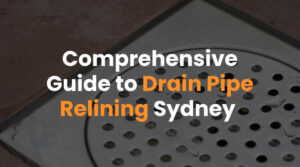Dealing with a blocked shower drain can be a frustrating and unpleasant experience, disrupting your daily routine. Learning how to unblock it is essential to restore optimal function to your bathroom drain, ensuring a swift and unhindered flow of water down the drain. Whether it’s caused by hair and soap scum build-up or an unidentified blockage, employing effective DIY methods or calling in a professional plumber like Plumbwell Plumbing Services can help address the issue promptly.
Recognising Signs of a Blocked Shower Drain
- Slow Draining Water: One of the most common indicators of a blocked shower drain is water slowly draining away, leading to standing water during your shower.
- Unpleasant Odours: Accumulated gunk, consisting of hair, soap scum, and other debris, often emits an unpleasant smell, signalling a potential blockage.
- Gurgling Noises: When you hear a fizzing or gurgling noise as water attempts to navigate through the clog, it’s a clear sign that something is impeding its path.
- Visible Blockage: Using a flashlight to look inside the drain opening, you might visibly see the clog causing the blockage. This could be a clump of hair or build-up of soap scum, especially underneath the sink’s plughole.
The Impact of a Blocked Shower Drain
Ignoring a blocked shower drain not only affects your bathroom usage but also poses potential risks and inconveniences that go beyond standing water in your bath or shower. The persistent moisture from a blocked drain can lead to:
- Unsanitary Conditions: The stagnation of water in your shower or bath drain can foster bacterial growth, generating health risks and unpleasant odours in your bathroom.
- Structural Damage: Continuous leakage or overflow from the blocked shower drain can cause water damage to the floor, walls, and underlying structures.
- Aesthetic Deterioration: Consistently damp conditions can lead to mould and mildew, discolouring grout and tiles, and impairing the overall look and hygiene of your bathroom.
Underlying blockages in your bathroom drain could stem from a myriad of sources, including internal and external factors that disrupt the smooth functionality of your plumbing system.
Essential Tools for Drain Unblocking
Arming yourself with the necessary tools to unblock a bath or shower is pivotal to ensuring that when blockages occur, you’re well-prepared to tackle them head-on. Consider these essential tools to help keep your bathroom drain free-flowing:
- Plunger: A staple in any home, the plunger can dislodge clogs by creating a vacuum and using pressure to loosen blockages.
- Drain Snake: Especially useful for hair clogs, a drain snake can navigate through pipes, allowing you to pull out or break up blockages.
- Bucket or Basin: Handy to collect any debris or water that emerges when you unblock your drain, protecting your bathroom floor.
- Rubber Gloves: To protect your hands during the unblocking process, ensuring hygiene and shielding you from any caustic substances.
- Torch or Headlamp: Illuminate your working area, particularly when working on obstructed bathroom sink drains.
Plungers and More: What You Need to Unblock a Bath
It’s often said that a tradesman is only as good as his tools, and this rings true when it comes to dealing with a blocked bath drain. Having discussed plungers and drain snakes, there are additional tools and methods that might be instrumental:
- Wire Coat Hanger: A straightened hanger with a hooked end can be an easy DIY tool to remove hair and other debris.
- Wet and Dry Vacuum: Set to the wet mode, it can be used to suck out whatever is causing the blockage.
- Sealant Strip: To be applied around the drain to ensure a tight seal while using a plunger, enhancing efficacy.
Chemical Solutions for a Clogged Bathroom Drain
Sometimes, physical methods might not suffice, and a chemical intervention becomes necessary to clear the blockage:
- Baking Soda and Vinegar: A natural remedy involves using a cup of baking soda and a cup of vinegar, allowing it to fizz and eat away at the blockage.
- Commercial Drain Cleaners: Always follow the instructions carefully and take precautions to protect your skin and eyes.
- Caustic Soda: Known for its potency in dealing with organic blockages but requires careful handling and protective gear.
Remember to always try the physical methods first, resorting to chemical solutions when these have failed, to prevent unnecessary exposure to harsh chemicals.
6 Ways to Effectively Unclog a Bath Drain
Navigating through the ordeal of a blocked bath or shower drain can be stressful. But, with the right techniques, unblocking becomes a breeze. Here are six methods to facilitate smooth water flow in your bathroom drain once more.
Method 1: Boiling Water Technique to Unblock a Bathroom Drain
Pour a kettle of boiling water directly into the drain. The intense heat can work wonders on dissolving soaps and greases causing a drain blockage, making this method a simple initial approach to try.
Method 2: Natural Remedies to Unblock a Bath Drain
Combine baking soda and white vinegar and allow it to work its magic in the drain. The reaction created from combining these two ingredients can help disintegrate gunk and build-up, providing a chemical-free unblocking method.
Method 3: Mechanical Methods for Unblocking
Using tools like a wire coat hanger, modified with a hook at the end, can be manually manoeuvred into the drain to fish out hair and other debris. Be gentle and cautious to avoid damaging your pipes.
Method 4: Using Plungers to Clear Bathroom Sink Blockages
A plunger can create a good seal around the drain cover and, with a bit of luck and some robust plunging action, might just shift the blockage, especially in cases of a clogged drain. Ensure you are using an appropriate type for sink clogs.
Method 5: Employing Drain Snakes for Deeper Clogs
A drain snake or plumber’s auger can be delved deeper into the plumbing to remove drain blockages that are out of reach for other methods. Ensure you follow any instructions or guidelines for using a drain snake to prevent damage.
Method 6: Chemical Unblocking for Stubborn Bathroom Drain Issues
For persistent blockages, chemical cleaners may be time-efficient. Pour the cleaner into the drain, ensuring to protect your skin and eyes, and leave it to sit before flushing with water. Always follow the instructions on the bottle and consider calling professional blocked drain plumbers for significant issues, ensuring you don’t cause more harm than good to your pipes.
Steps to Unblock a Shower Drain
Unblocking a clogged drain, especially in the bathroom, can feel like a daunting task. However, it’s often possible to clear a shower blockage yourself with the right knowledge and tools in hand. These steps will guide you through a DIY drain unblocking process, keeping it simple, safe, and efficient.
- Identify the Blockage:
- Look for obvious signs of blockage by examining the drain cover. Hair and soap scum often create a visible barrier.
- Remove the Drain Cover:
- Make sure you don’t cause damage and unscrew or lift the drain cover safely to access the blockage.
- Manual Removal:
- Using a pair of rubber gloves, manually remove any visible obstructions. Sometimes, unblocking drains can be as straightforward as pulling out accumulated hair and debris.
- Utilise Boiling Water:
- Carefully pour a kettle of boiling water down the drain. The heat can dissolve soap scum and other minor blockages.
When to Hire a Professional for Unblocking a Clog in Your Bathroom Sink or Drain
While tackling a clog in your bathroom sink or drain can often be a DIY endeavour, there are situations when it’s best to leave the job to the professionals. Here are some instances when you should consider contacting expert drain unblocking services:
- Recurring Blockages: If you find that your bathroom sink or drain is frequently getting blocked, it might be an indication of a deeper issue within your plumbing system. Professionals can perform a thorough inspection to identify and address the root cause.
- Slow Drainage: When water drains slowly from your sink or shower, it could be a sign of a partial blockage that needs professional attention. Slow drainage can lead to more severe clogs if left untreated.
- Foul Odours: Persistent foul odours emanating from your bathroom sink or drain could be a sign of a significant blockage or sewage backup. Professionals can safely and effectively resolve such issues.
- DIY Efforts Fail: If you’ve attempted DIY methods and the clog persists or worsens, it’s time to call in experts who have the tools and expertise to handle stubborn blockages.
- Visible Damage: If you notice visible damage to your plumbing pipes or fixtures, such as leaks or corrosion, it’s essential to have a professional plumber assess and repair the issue to prevent further damage.
Don’t hesitate to contact our expert drain unblocking services when you encounter any of these situations. Our team of experienced plumbers is ready to provide prompt and efficient solutions to keep your bathroom plumbing in optimal condition.
Contact Us for Expert Drain Unblocking Services
When you’re faced with a challenging clog or plumbing issue in your bathroom sink or drain, don’t stress over DIY attempts that may not work. Instead, reach out to our professional plumbing team for reliable and effective drain unblocking services. We are here to ensure your plumbing system runs smoothly, and your bathroom remains a functional and hygienic space.
Call today on (02) 9064 2861 for expert drain unblocking services and enjoy the peace of mind that comes with a properly functioning bathroom plumbing system.








